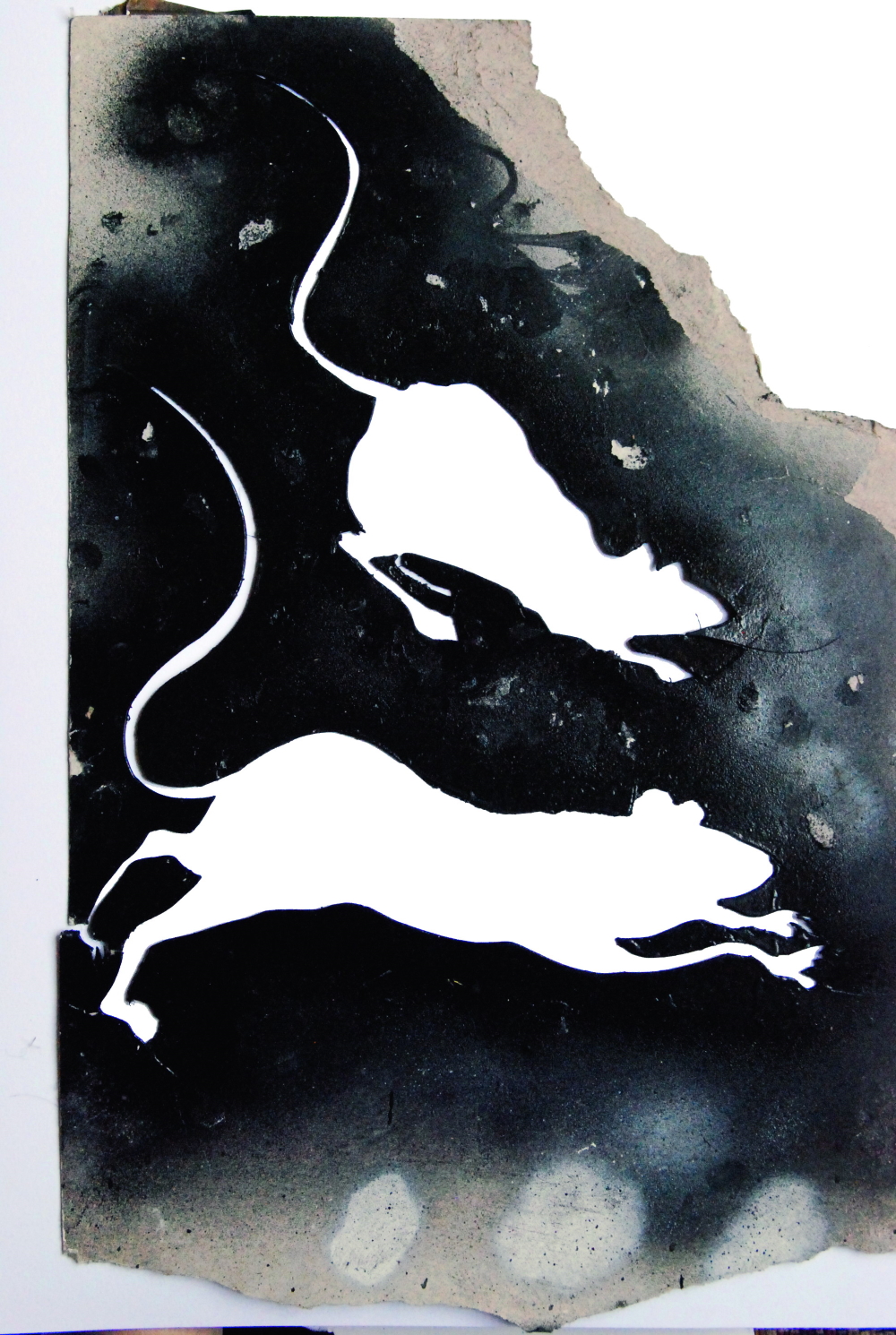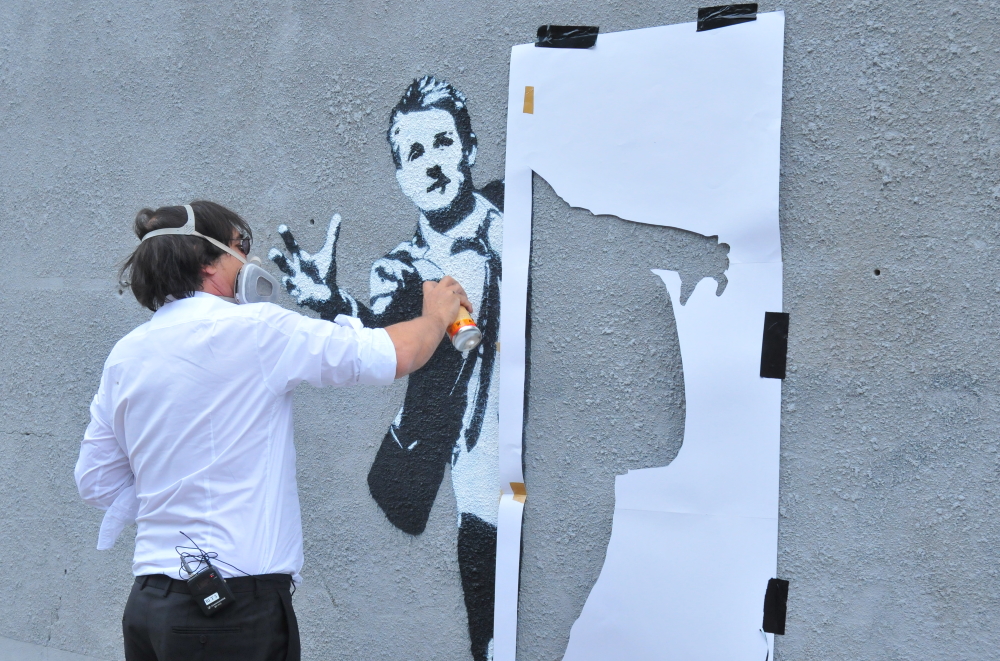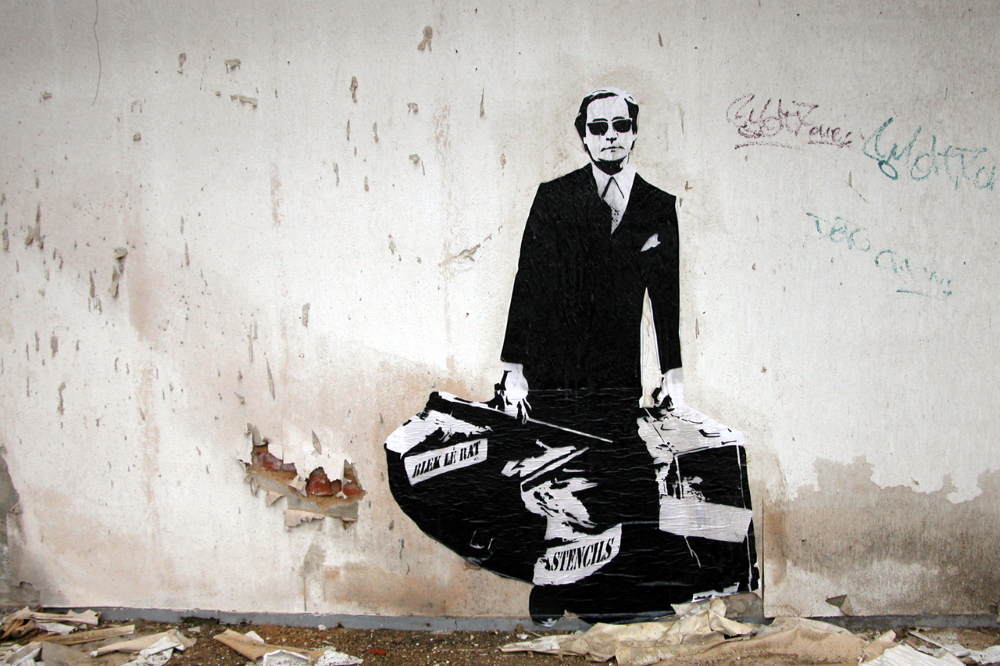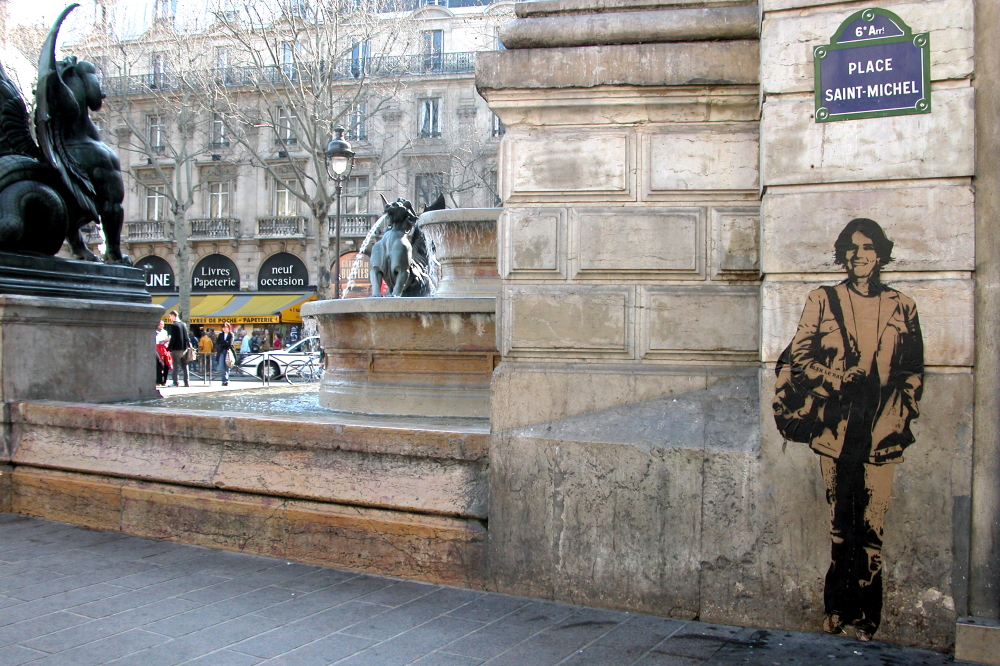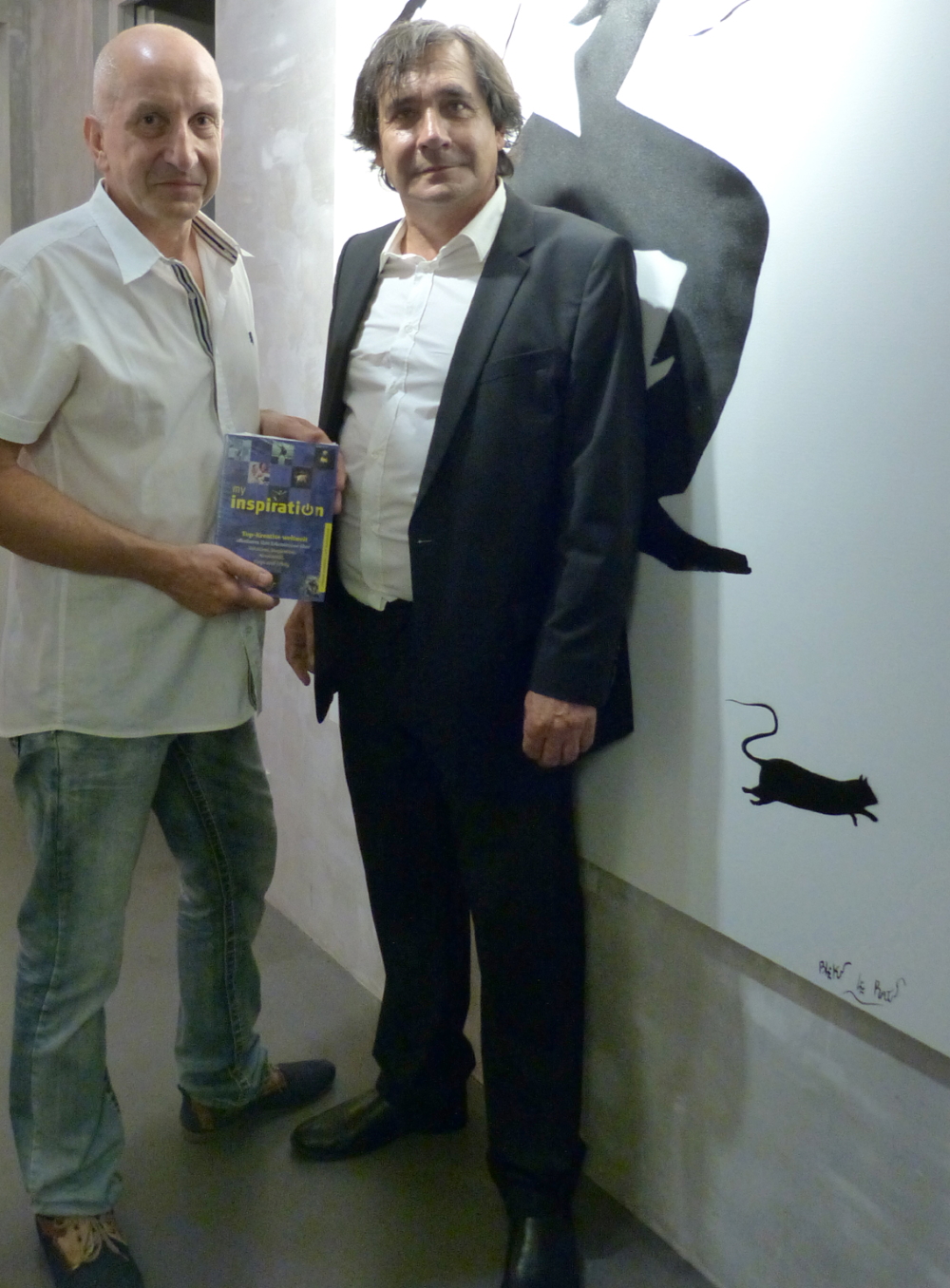Blek Le Rat
forefather of stencil street art
France
He anticipated the kind of stencil graffiti for which Banksy is world-famous. Therefore he has been one of the 100 most influential people in the world, according to TIME magazine in 2010: Xavier Prou, better known by his pseudonym Blek le Rat, based on an Italian comic strip and his favourite motif “the rat” being the anagram for “art”.
Blek Le Rat
forefather of stencil street art
France
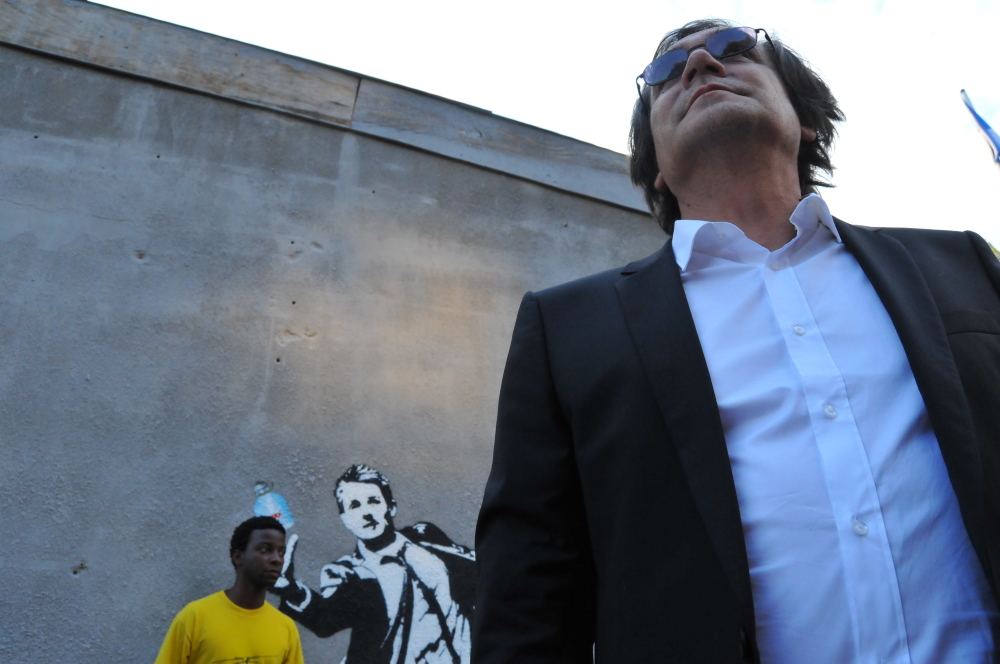
The French-born artist, who first studied graphic arts and then design at the’ École des Beaux Arts’ in Paris, is considered the forefather of stencil art in public spaces (not only in France). In contrast to freehand graffiti, stencils are made of cardboard, plastic, laminated paper, metal or wood. This enables the frequent reproduction of a motif.
In October 1981, the artist tried conventional spraying with a friend. This failed. Prou (* 15 November 1951) remembered a stencil graffiti he had seen as a child during a trip to Italy with his parents and from then on worked according to this technique. David Hockney’s film 'A Bigger Splash' had the greatest influence on his work. The British painter, graphic artist, set designer and photographer is one of the most influential artists of the 20th century.
Blek le Rat's works can be seen not only in his home city of Paris but also in Berlin, Cologne, Leipzig, Wiesbaden, London, New York, San Francisco, Florence, Naples, Lisbon, Buenos Aires and Marrakech. Stencil graffiti by him, about whose work the monograph 'Blek le Rat: Getting Through The Walls - Street Graphics/Street Art' (Thames & Hudson) gives a representative impression, is said to have significantly inspired street art world star Banksy.
Xavier Prou is married, father of a son and lives in Paris (France).
Interview September 2015
"Beaux Arts": the 'rat' that became 'art'
ABOUT INTUITION & INSPIRATION
The Romanian-French sculptor Constantin Brancusi said about his creation process: “Things are not difficult to make. What is difficult is, putting yourself in the state of mind to make them“. Before the creativity, there is intuition. Where does this intuition come from, what sparks it? How does it manifest itself – is it only a vague idea or tangible?
I agree with the quote. I follow up my intuition since my early life. I think intuition is a part of God that we have inside of us all.
Is the timeframe of intuition only temporary or can it be supported by external factors (even drugs)?
I don’t believe in drugs neither alcohol. We need to have a normal life with no excess. I have seen so many artists in my life losing their life in taking drugs or alcohol and having a disorganized life. The key of creation is work and work again!
Is intuition reliant on spontaneity or is it possible to engage this spiritual resource at any time, consciously? If so, how?
I don’t believe in spontaneity. I believe in intuition, because I have tested it many times in my life and most of the times my intuition was right.
How important is the own physical constitution? Is it true that sadness equals creativity (or vice versa?)? to quote the writer Miller Williams: “The saddest joys are the richest ones”…
When I am working in my studio I forget sadness and happiness. I am concentrated on my work and that’s it. In one moment I have too much problems: I can’t work. The first thing I do, is, solve my problem first and then I feel free to work.
Do calm and relaxation further the „best“ or is a tight deadline a stimulant for creativity?
I need calm and relax to work. I live with my family in a house in the countryside and I can spend several weeks seeing only my family and no one else. I need solitude a lot. I don’t feel really comfortable with many people around.
Which place/what environment is best for your creation/work process?
Solitude is the best environment in my opinion. I have changed my feeling about that: When I was young, I could work and create in a studio with other people. I can’t do it now. I need to be alone with no interaction with other people. About the place, it is not a major problem. I can work everywhere…
What, if there is a deadline, but no intuition?
In that case I go to museum to see beautiful paintings from the past. It is like a new birth at each time.
Before intuition is inspiration the primary catalyst? If so, what inspires you?
I am inspired by all forms of art, music, cinema, literature, dance. We don’t invent anything new. We talk always of the same things, but I add my own style. A proper style is very important and very difficult to find. It’s very hard and long work to find a style. That’s the reason why when an artist finds a style to express himself, he is copied by others who don’t have the energy to work their own style. It is terrible to see artists trying to have a style in copying the style of another one!
According to Philip Roth „amateurs wait for inspiration while professionals sit down and work.“ How do you feel about that?
It is true. I sit down and work rather than waste my time waiting for inspiration!
ABOUT CREATIVITY
According to novel-price-awarded author Nelly Sachs “everything starts with yearning”. Do you agree?
Yes, I agree with that. The yearning before to start something is the energy which commands the action!
Is it magic or torture to be creative?
It’s neither one or the other. It’s natural and, anyway, pure creation doesn’t exist.
When you are in a creative phase, are you working as if being in trance?
No, not really. It’s only work.
Which is better for creativity: discipline and structured time-management or idleness?
Discipline and structured time management are better. No constraint.
Does age and life experience help with creativity or is a younger mind more creative, because it is fresh and untouched by experience? What about social/cultural heritage?
Age and own life-experience help for creativity.
How important is talent for creativity? Is art based on talent?
Talent comes with work. If you practice your art for 12 hours every day, it’s like sport. You need to practice to have a result.
Do you archive certain ideas to maybe check back when you are in a less creative phase?
I am not organised to archive my ideas.
Did you ever revisit an older idea that you thought would be worthless, but it turned out to be great/good?
Yes. I did that sometimes.
Is it better to be creative on your own, only trust your own instinct, or in a team? However, in a team - how much of your own, personal idea is really left afterwards?
I am always on my own. I have no experience to work with a team.
Who’s leading in the creativity-process: craftmanship or spontaneous intuition/inspiration?
Craftsmanship leads in the creativity-process.
Which roles play aspects such as sincerity, authenticity, self-doubt when it comes to creativity and are they useful for the creative process?
Of course sincerity, authenticity.
If you would make a pie chart: How are emotions, mind and commercial interests distributed in percentages when it comes to the creative process?
Emotion 60%, 40% the rest.
Which is better in a developmental process: speed, meaning to grasp the magic of the moment, or a slow, ripening process when it comes to implementation and elaboration?
For me it is definitely the ripening process. Creativity takes time to mature.
Is creativity mostly a fun process or one that means blood, sweat and tears?
Blood, sweat and tears.
What is the individual satisfaction based on: a) self-realization and individual fulfilment, b) the (artistic) recognition or c) commercial success?
A, B, and C.
What is your personal motivation for creative activity?
I want to leave my marks in the history of art.
Which role does perfection play when it comes to creativity? Is a completely perfect opus soulless?
For me perfection is something else. If perfection means flawless, then, yes, I think, too clean and shiny works can be somehow soulless. I like it when u see that the artist has worked out his painting.
How much does routine influence creativity?
Routine is the basis of creativity.
Can routine, experience and professionalism make up for lack of creativity? And if so - how much?
Never. If you link professionalism to craftmanship, knowing that technique is a tool, but no guarantee for creativity.
What role does workmanship play in creativity? Can it be an obstacle?
Yes. A lack of workmanship can be an obstacle, but on the other hand doesn’t substitute. Other artists such as the French painter Henri Rousseau imposed their lack of workmanship only to develop their own personal style.
How is it possible to stay true to yourself artistically, but stay innovative at the same time? Can you keep re-inventing yourself without renouncing/denying your style?
My style has become my language and I wouldn’t know how to express myself otherwise.
Is it desirable to be ahead of your time or does it cause to be misunderstood (or not understood at all)?
Unfortunately no one is a prophet in his own land!
Are creative people especially sensitive, because they have a particular feeling?
Yes, I would say so.
When does the time come to end the creative process, to set the finalized work free - or is there a never-ending possibility of improvement?
It is a never-ending process, but there comes a moment, when u have to stop it.
ABOUT SUCCESS
Is there an individual prototype for success? In other words: Is success projectable?
I think, it is important to be ambitious and to have the will to succeed. This makes success somehow projectable.
When something is successful, how big is the temptation to recycle it, to repeat the successful prototype?
I think, this differs from artist to artist. I believe someone with a big creative potential would rather develop further than simply redoing the same over and over again. But success also depends on many other factors.
How do you stay open to criticism despite success?
Anyway – you can’t be loved by everyone. And if I would be loved by everyone, I would really wonder what I did wrong!
How do you deal with a moment, where your individual, perfect work has been created, maybe has been praised and nominated with all possible awards – what will be next? Or is the personal peak also “the end”?
I am aware of that and I do not fear it.
In your mind, what is the reason for being successful for a long period of time and all of a sudden the success is gone? Is this a matter of the contemporary taste and different times or is it just a natural development that once one is on top for some time, there’s only one way – down?
Again, what is the definition of failure?
How do you deal with a moment, when your individual, perfect work has been created, maybe has been praised and nominated with all possible awards – what will be next? Or is the personal peak also “the end”?
My work has never been nominated for any award, so I do not think about this.
MY FAVORITE WORK
"My trademark is the rat, hence the name Blek le Rat. The rat is also the anagram of the word 'ART' (French for art). Rats are subversive survivors and omnipresent in Paris."
